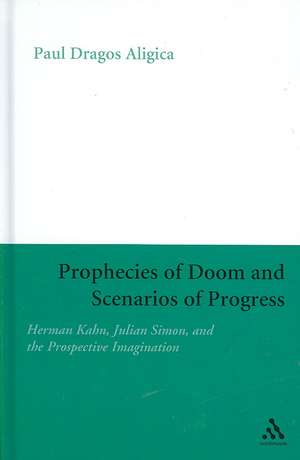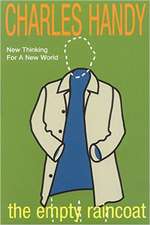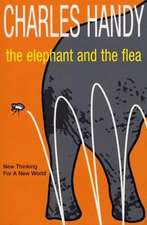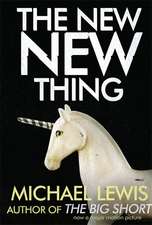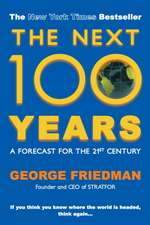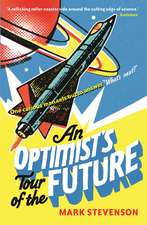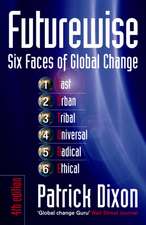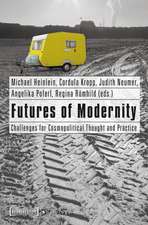Prophecies of Doom and Scenarios of Progress: Herman Kahn, Julian Simon, and the Prospective Imagination
Autor Dr Paul Dragos Aligicaen Limba Engleză Hardback – 30 noi 2007
Preț: 828.74 lei
Preț vechi: 1195.65 lei
-31% Nou
Puncte Express: 1243
Preț estimativ în valută:
158.58€ • 166.01$ • 131.21£
158.58€ • 166.01$ • 131.21£
Carte tipărită la comandă
Livrare economică 05-19 aprilie
Preluare comenzi: 021 569.72.76
Specificații
ISBN-13: 9780826428721
ISBN-10: 082642872X
Pagini: 128
Dimensiuni: 161 x 231 x 15 mm
Greutate: 0.33 kg
Editura: Bloomsbury Publishing
Colecția Continuum
Locul publicării:New York, United States
ISBN-10: 082642872X
Pagini: 128
Dimensiuni: 161 x 231 x 15 mm
Greutate: 0.33 kg
Editura: Bloomsbury Publishing
Colecția Continuum
Locul publicării:New York, United States
Caracteristici
A specialized monograph on two important Conservative thinkers.
Cuprins
INTRODUCTION CHAPTER 1: The Great Transition and the Limits to Growth The Resourceful Earth versus Global 2000 The Historical and Macro-Sociological Background: The Great Transition The Pro-Growth MomentumThe Cultural Contradictions of Economic GrowthPsychology, Mass Media and the Rhetoric of Bad NewsThe Epistemic Angle: Organizational and InstitutionalThe Epistemic Angle: Conceptual and SubstantiveIn Search of SolutionsCHAPTER 2: Dealing with the Challenge of the Future: Approaches and MethodsThe Dichotomies Defining a Realistic and Accurate Approach The Economic Way of ThinkingBroad Studies and the Challenge of Expert Knowledge The Institutionalization of InterdisciplinarityThe Heuristic and Propaedeutic DimensionsScenarios, Alternative Futures and the Method of Classes of VariablesLimits and ChallengesThe Role of Knowledge in SocietyCHAPTER 3: An Emerging Paradigm: The FoundationsThe Ontological Dimension: Open Systems and EntropyThe Social Philosophy Dimension: Evolution, Social Exchange and CreativityThe Epistemological Dimension: Pragmatic and Eclectic Operationalism The Axiological Dimension: Values as Constitutive Principles and Policy YardsticksThe Value of TruthCONCLUSIONS
Recenzii
"Julian would have been grateful and honored to read the ideas he cared about so strongly presented with the clarity and accuracy that they appear in Prophecies of Doom and Scenarios of Progress. In the name of Julian Simon, I thank you."-Rita J. Simon, University Professor in the School of Public Affairs and the College of Law at The American University
"Anyone interested in the use of scientific models to predict gloom and doom scenarios (today's global warming prophets?) must read this powerfully crafted book. Paul Dragos Aligica applies the seminal works of Herman Kahn and Julian Simon, who wisely and correctly rejected 'limits to growth' predictions in the 1970s, to show that futurism is not just about scientific models and facts but choices involving human freedom, closed versus open social institutions, and incremental versus apocalyptic policy adaptations." -Henry R. Nau, Professor of Political Science and International Affairs, Elliott School, George Washington University and former adviser to Presidents Ford and Reagan
"Paul Dragos Aligica's book is a critically important contribution to intellectual history and social analysis that could serve us well in today's debate about global climate change. The book returns to the 'limits to growth' debate of the 1970s, describes the refreshingly optimistic response made by Herman Kahn and Julian Simon to that debate, and builds models of thought and action based on the Kahn-Simon response. Once again, we are reminded of the singular usefulness of analyses based on an honest description of scenarios that rely on human creativity and market incentives and the hopelessness of analyses that are not so based."-Bruce Yandle, Alumni Distinguished Professor of Economics Emeritus Clemson University, former executive director of the Federal Trade Commission
"I am very impressed with the quality of writing and discussion. Economic growth is a moral as well as a technical issue. In recent years, many environmentalists have questioned the real human gains from economic progress. Drawing on the work of Herman Kahn and Julian Simon, this book valuably and insightfully explores this debate, showing that there can be no turning away from the path of continued economic growth."-Robert H. Nelson, Professor of Environmental Policy at the School of Public Affairs of the University of Maryland and Senior Fellow of the Competitive Enterprise Institute
"Anyone interested in the use of scientific models to predict gloom and doom scenarios (today's global warming prophets?) must read this powerfully crafted book. Paul Dragos Aligica applies the seminal works of Herman Kahn and Julian Simon, who wisely and correctly rejected 'limits to growth' predictions in the 1970s, to show that futurism is not just about scientific models and facts but choices involving human freedom, closed versus open social institutions, and incremental versus apocalyptic policy adaptations." -Henry R. Nau, Professor of Political Science and International Affairs, Elliott School, George Washington University and former adviser to Presidents Ford and Reagan
"Paul Dragos Aligica's book is a critically important contribution to intellectual history and social analysis that could serve us well in today's debate about global climate change. The book returns to the 'limits to growth' debate of the 1970s, describes the refreshingly optimistic response made by Herman Kahn and Julian Simon to that debate, and builds models of thought and action based on the Kahn-Simon response. Once again, we are reminded of the singular usefulness of analyses based on an honest description of scenarios that rely on human creativity and market incentives and the hopelessness of analyses that are not so based."-Bruce Yandle, Alumni Distinguished Professor of Economics Emeritus Clemson University, former executive director of the Federal Trade Commission
"I am very impressed with the quality of writing and discussion. Economic growth is a moral as well as a technical issue. In recent years, many environmentalists have questioned the real human gains from economic progress. Drawing on the work of Herman Kahn and Julian Simon, this book valuably and insightfully explores this debate, showing that there can be no turning away from the path of continued economic growth."-Robert H. Nelson, Professor of Environmental Policy at the School of Public Affairs of the University of Maryland and Senior Fellow of the Competitive Enterprise Institute
Descriere
This book focuses on the alternative paradigm, the pro-growth intellectual tradition that rejected the prophecies of doom and called for realism and pragmatism in dealing with the challenge of the future.
